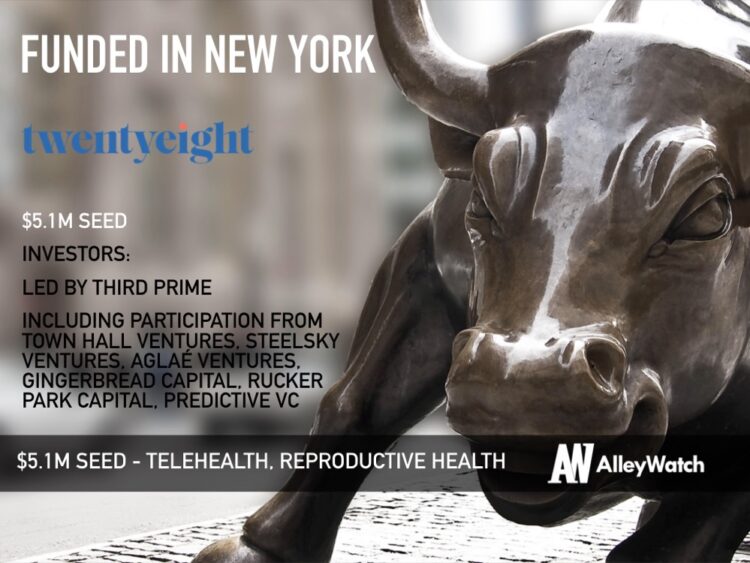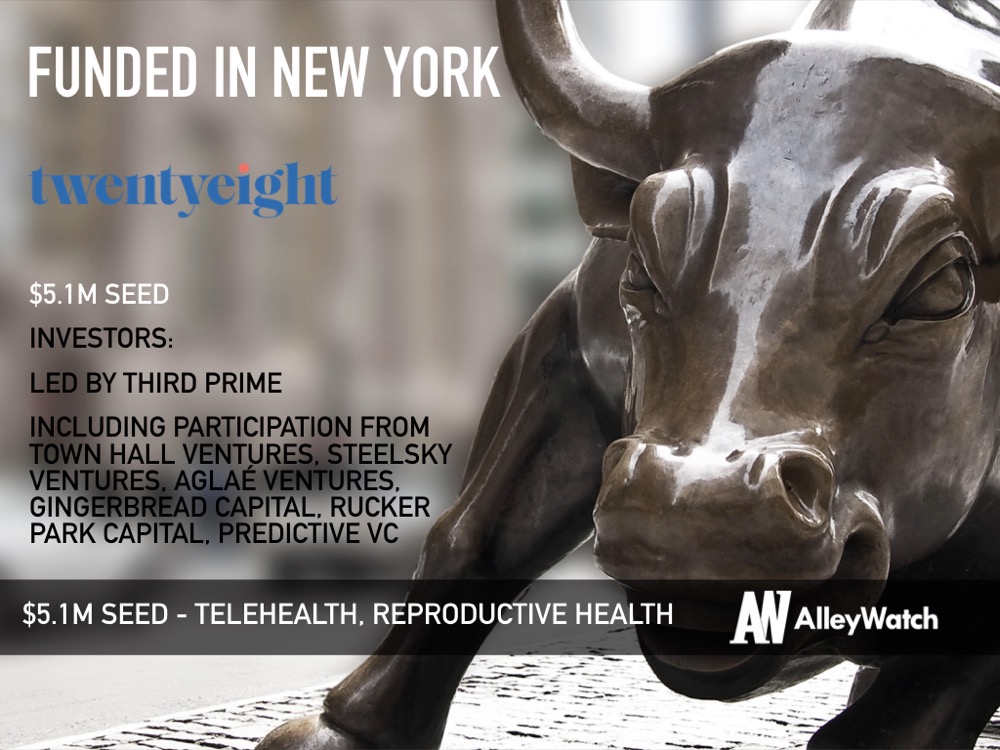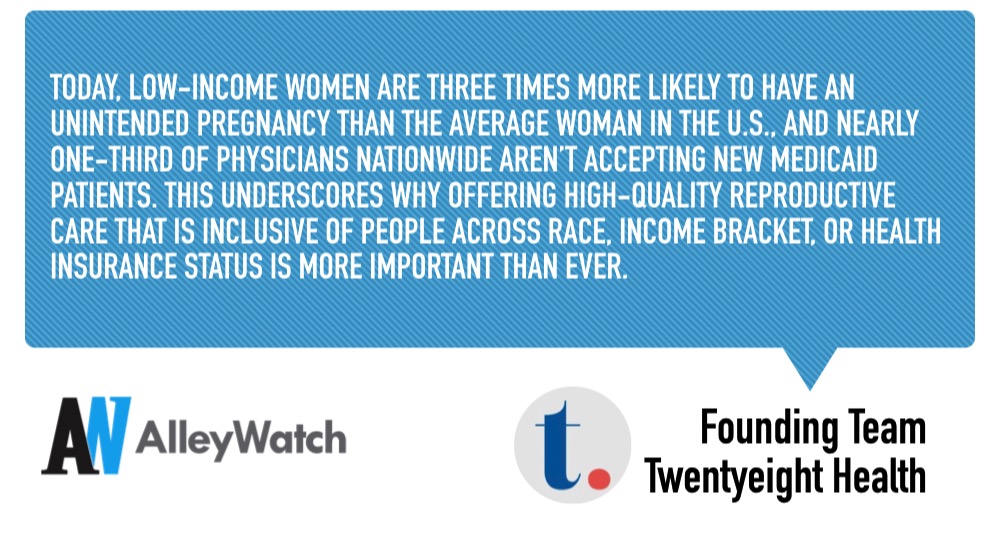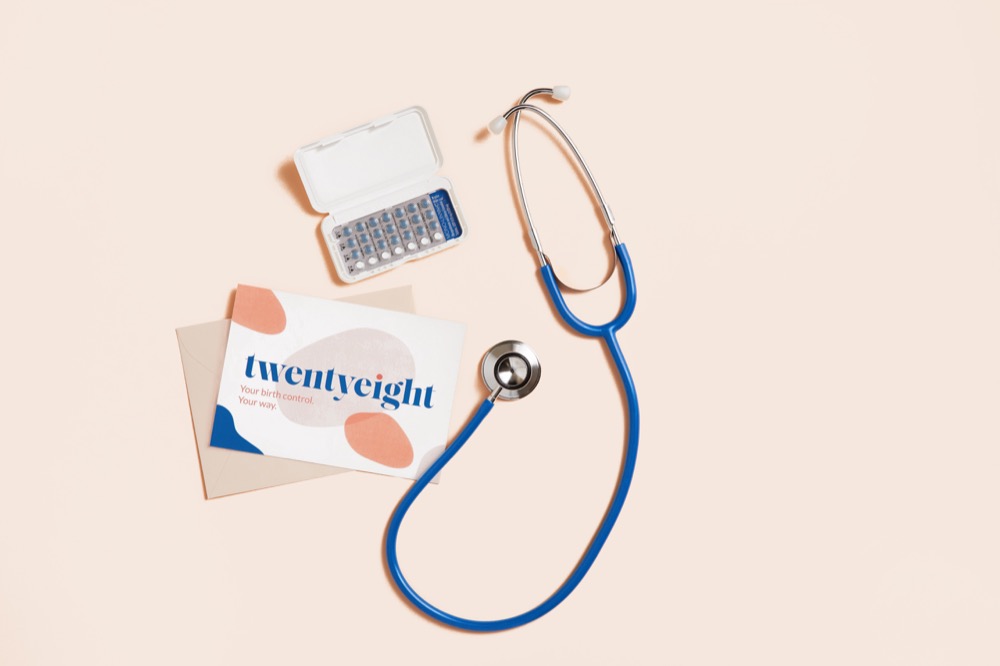Twentyeight Health is on a mission to provide women who are on Medicaid or are underinsured with access to affordable sexual and reproductive healthcare. The company’s telemedicine platform, launched in 2018, allows patients to seamlessly consult with physicians online, order 100+ FDA-approved brands of birth control of various types, and delivers within 1-3 business days. The service is currently available in six states – NY, FL, MD, NJ, NC, and PA with plans to expand nationwide.
AlleyWatch caught up with Twentyeight Health founders (both former Bain consultants) Bruno Van Tuykom and Amy Fan to learn more about how certain segments of the population struggle with access to reliable contraception options, the company’s impressive traction, and recent funding round. Twentyeight Health currently has 20+ employees and raised a total of $6.6M.
Who were your investors and how much did you raise?
Twentyeight Health closed $5.1M in Seed funding. Third Prime led the round, with participation from Town Hall Ventures, SteelSky Ventures, Aglaé Ventures, GingerBread Capital, Rucker Park Capital, Predictive VC and strategic angels including Stu Libby, Zoe Barry, and Wan Li Zhu. The seed round brings Twentyeight Health’s total funding to $6.6M.
 Tell us about the product or service that Twentyeight Health offers.
Tell us about the product or service that Twentyeight Health offers.
Twentyeight Health is a telemedicine company offering affordable access and convenience for women’s sexual and reproductive healthcare.
To sign up for Twentyeight Health, new customers fill out a medical questionnaire online, which a US board-certified doctor reviews within 24 hours. Online audio consultations are also available at no extra charge. Customers can access over 100 FDA-approved brands of birth control pills, patch, ring, shot, and emergency contraception, and receive shipment within 1-3 business days. Twentyeight Health provides ongoing care through unlimited doctor follow up messages to discuss issues such as updating prescriptions or addressing side effects.
What inspired the start of Twentyeight Health?
Bruno Van Tuykom: I spent 8 years working for BCG, helping healthcare organizations. I spent the majority of that time helping the Gates Foundation improve access to healthcare in developing countries. I deeply care about improving access to healthcare and think that there is still a lot of work to be done. Through my experience at Gates, I realized the potential that telemedicine could have in improving access to care, particularly when it comes to women’s health.
Amy Fan: Prior to Twentyeight, I was the GM of a NYC-based DTC skincare & makeup startup. Working in the beauty industry, I leveraged my skills as a former Bain consultant to deeply understand our customers from quantitative and qualitative perspectives. In parallel, I was living in the US for the first time and experienced how difficult it is for a patient to navigate the system—even with insurance. I wanted to bring the human-centric approach from beauty to healthcare, reimagining patient experiences to be simple, dignified, and approachable. I wanted to tackle the largest gap in healthcare – access for underserved communities. Bruno and I met through his friend & colleague from BCG, and we decided to form & launch Twentyeight Health.
How is Twentyeight Health different?
Our primary focus is on providing underserved communities with access to sexual and reproductive care.
Today, low-income women are three times more likely to have an unintended pregnancy than the average woman in the US, and nearly one-third of physicians nationwide aren’t accepting new Medicaid patients. This underscores why offering high-quality reproductive care that is inclusive of people across race, income bracket, or health insurance status is more important than ever.
Twentyeight Health is currently available across six states—Florida, Maryland, New York, New Jersey, North Carolina, and Pennsylvania—and is the first and only telecontraception company to accept Medicaid in these states. Twentyeight Health is also working to provide free birth control for women who are not able to pay out of pocket and are uninsured, through a partnership with Bedsider’s Contraceptive Access Fund. We donate 2% of revenues to Bedsider and the National Institute for Reproductive Health.
What market does Twentyeight Health target and how big is it?
Our focus is on providing healthcare access to the underserved majority— 60% of women of reproductive age in the U.S. are covered by Medicaid, underinsured, or uninsured. This means there are over 40 million women in reproductive age across the U.S. in need of a better way to access women’s healthcare services.
What’s your business model?
For birth control, we currently offer 100+ brands at $0 copay with insurance and 60+ brands starting at $16/pack without insurance. For women who are under- or uninsured, we are working to provide free birth control through partnerships with organizations like Bedsider’s Contraceptive Access Fund.
We accept all major insurance plans, including Medicaid.
How has COVID-19 impacted the business?
Women who are on Medicaid, who are underinsured or without health insurance often struggle to find access to reproductive health services, and these struggles have only increased with the COVID-19 pandemic limiting access to in-person appointments. We are fighting for healthcare equity, ensuring that all women, particularly BIPOC women and women from low-income backgrounds, can access high-quality, dignified, and convenient care.
We’ve seen the need for our services, with our customer base growing 5x compared to 2020.
What was the funding process like?
It went really well but it was definitely intense. We didn’t fully know what to expect with all the investor discussions being virtual over the summer. But we have been impressed by how engaged investors were and, in our case, the whole process went relatively fast from start to finish.
What are the biggest challenges that you faced while raising capital?
Raising capital during a health pandemic was unprecedented. Early on, many investors focused their efforts on supporting portfolio companies and it was difficult to predict how investor behavior might shift as the pandemic continued. However, the pandemic also showed the need for healthcare delivery innovation, particularly for underserved populations that were often disproportionately impacted by COVID-19.
What factors about your business led your investors to write the check?
Our differentiation and the moat that we built to focus on underserved populations was key.
Our differentiation and the moat that we built to focus on underserved populations was key.
Other important factors played a role, such as the strong traction we have, our end vision, our unique user acquisition strategy, and the quality of our team.
What are the milestones you plan to achieve in the next six months?
Our seed round will fuel our expansion across the country, and help us provide access to additional medications and services for women’s sexual and reproductive health over the next year.
What advice can you offer companies in New York that do not have a fresh injection of capital in the bank?
Focus on the smallest, cheapest, and fastest version of your idea to test it and hopefully prove it. Then if you get good results, go on, and raise some money. My recommendation is to always raise what you need, and not what you can (which sometimes can be a lot more money).
Where do you see the company going now over the near term?
Our vision is to support women as they go through different life stages, and we are excited to expand our offerings to multiple aspects of reproductive and sexual health.
What’s your favorite outdoor dining restaurant in NYC
Van Tuykom: I am from Belgium so one of my favorite places is Bxl Zoute in Flatiron. They serve amazing Belgian food and beers, in a great atmosphere.
You are seconds away from signing up for the hottest list in New York Tech! Join the millions and keep up with the stories shaping entrepreneurship. Sign up today






